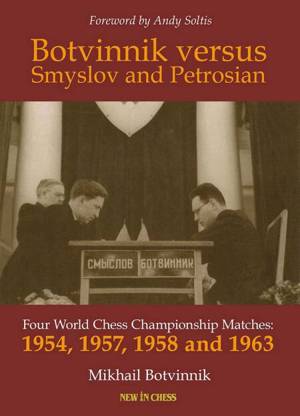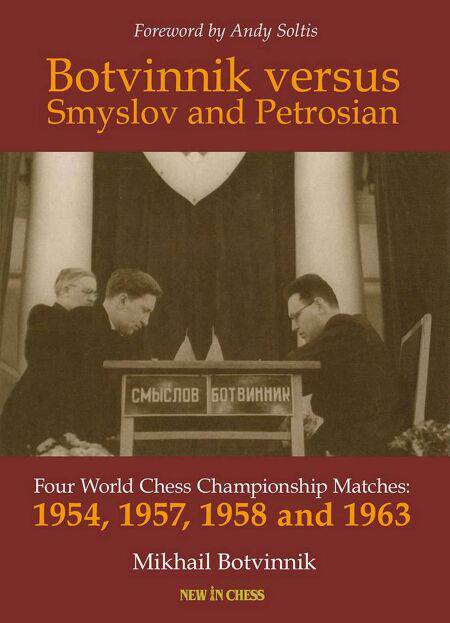
- Retrait en 2 heures
- Assortiment impressionnant
- Paiement sécurisé
- Toujours un magasin près de chez vous
- Retrait gratuit dans votre magasin Club
- 7.000.0000 titres dans notre catalogue
- Payer en toute sécurité
- Toujours un magasin près de chez vous
Botvinnik versus Smyslov and Petrosian EBOOK
Four World Chess Championship Matches - 1954, 1957, 1958 and 1963
Mikhail Botvinnik
Ebook | Anglais
26,83 €
+ 26 points
Description
The writings of Mikhail Moiseevich Botvinnik (1911 – 1995) are legendary. And Botvinnik’s legacy is deeply imprinted in the DNA of every grandmaster today, says Andy Soltis in his foreword to this book. ‘The Patriarch’ took professionalism in chess to a new level and was the first to emphasize preparation: what a player does before a game plays an enormous, if not decisive, role in what happens during a game.
In this book, Botvinnik writes the story of the three clashes with his compatriot Vasily Smyslov, matches full of tension between two virtually equal opponents, and his match with Tigran Petrosian, which marks the end of an era: the mighty Botvinnik lost his world title fifteen years after he conquered the highest crown for the first time.
The first part of this book gives Botvinnik’s view of three World Championship matches and how he prepared for them. The matches were as great a clash of personalities as in any world championship, as much as Karpov versus Kasparov. While Botvinnik played the role of a stern father, Smyslov was like the smiling, easy-going uncle. Botvinnik was proud of what he called his ‘hard character’. Smyslov seemed to get along with everyone. His attitude was to try to do his best and let fate decide.
The last part of the book is the gripping account of a heroic battle. The ageing Botvinnik desperately tries to bounce back after his Armenian opponent Tigran Petrosian has taken an early lead, but ultimately, The Patriarch fails.
Mikhail Botvinnik, one of the greatest chess players of all time, analyses many of the games, reveals his match strategy and comments on the strategic choices of his opponent. This important historical document also features annotations and writings by Smyslov, Petrosian and other top grandmasters, the games of a secret training match by Botvinnik and Botvinnik’s legendary notebooks, including the final one containing his preparation for a match with Bobby Fischer in 1969 – a match that was never to be.
In this book, Botvinnik writes the story of the three clashes with his compatriot Vasily Smyslov, matches full of tension between two virtually equal opponents, and his match with Tigran Petrosian, which marks the end of an era: the mighty Botvinnik lost his world title fifteen years after he conquered the highest crown for the first time.
The first part of this book gives Botvinnik’s view of three World Championship matches and how he prepared for them. The matches were as great a clash of personalities as in any world championship, as much as Karpov versus Kasparov. While Botvinnik played the role of a stern father, Smyslov was like the smiling, easy-going uncle. Botvinnik was proud of what he called his ‘hard character’. Smyslov seemed to get along with everyone. His attitude was to try to do his best and let fate decide.
The last part of the book is the gripping account of a heroic battle. The ageing Botvinnik desperately tries to bounce back after his Armenian opponent Tigran Petrosian has taken an early lead, but ultimately, The Patriarch fails.
Mikhail Botvinnik, one of the greatest chess players of all time, analyses many of the games, reveals his match strategy and comments on the strategic choices of his opponent. This important historical document also features annotations and writings by Smyslov, Petrosian and other top grandmasters, the games of a secret training match by Botvinnik and Botvinnik’s legendary notebooks, including the final one containing his preparation for a match with Bobby Fischer in 1969 – a match that was never to be.
Spécifications
Parties prenantes
- Auteur(s) :
- Editeur:
Contenu
- Nombre de pages :
- 480
- Langue:
- Anglais
Caractéristiques
- EAN:
- 9789083347967
- Date de parution :
- 28-08-23
- Format:
- Ebook
- Protection digitale:
- Adobe DRM
- Format numérique:
- ePub

Seulement chez Librairie Club
+ 26 points sur votre carte client de Librairie Club
Les avis
Nous publions uniquement les avis qui respectent les conditions requises. Consultez nos conditions pour les avis.





